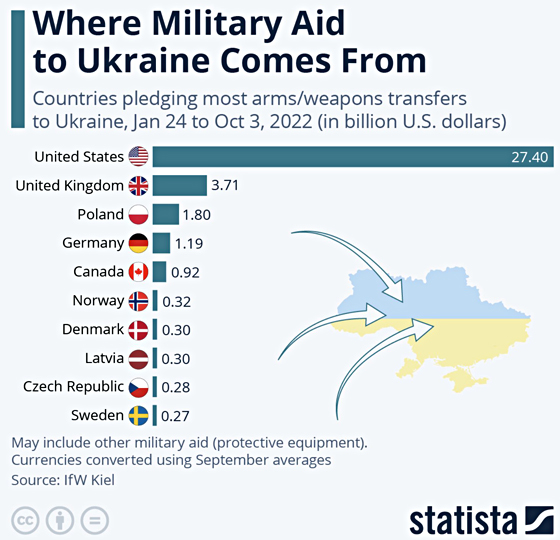Reprinted with permission from Econlib.

In 2022, the U.S. government approved expenditures of $113 billion on aid to Ukraine. The Committee for a Responsible Federal Budget writes:
In total, CBO estimated that $6.6 billion of the $113 billion would be spent in FY 2022 and another $37.7 billion in FY 2023. Furthermore, CBO estimated more than half of the approved funds would be spent by the end of FY 2024 and more than three-fourths by the end of FY 2026.
How much will that cost the average household? There are approximately 131.2 million households in the United States. So the average cost per household is $113 billion divided by 131.2 million, which is $861.
Of course, averages are often under-informative. That’s true of this one. In 2018, according to the Brookings Institute, high-income households, those in the top 20% of the income distribution, paid about 68 percent of all the tax revenue that the federal government collected. To be in the top quintile that year, you needed to have an income of $153,301 or more.
Assume for simplicity that these numbers, adjusted for inflation, are about the same today. Also, I’ll assume, even though I know it’s false, that this $113 billion will be paid entirely out of taxes rather than new debt. It’s not as bad an assumption as it looks. To the extent it’s paid out of new debt and to the extent future taxes pay off that debt, based on a progressive tax structure such as the one we have now, it would be a pretty good assumption.
So the top quintile would pay 68% of $113 billion, which is $76.8 billion. There are approximately 26 million households in the top quintile. So the cost per top-quintile household is $76.8 billion divided by 26 million, which is $2,956.
That’s a lot to fight someone else’s war.
Consider my wife’s and my case. In 2018, our income put us in the top quintile, probably just below the top 10 percent. So because we aren’t socked by high income tax rates to the same extent as the top 10 percent, our cost is probably closer to $2,000 than to $2,956. Let’s say it’s about $2,200.
Put it in perspective this way. In the first month of the war, my wife and I wanted to “do something” to help Ukrainians. A friend recommended giving money to a local restaurant owner who has relatives in Ukraine. She trusts him and we trust her. So we gave him $100. I know that that’s not much, but the $2,200 number above gives an idea of just how “not much.” We’ll pay in federal tax revenues about 22 times the amount we contributed voluntarily.
David R. Henderson is a research fellow with the Hoover Institution and an emeritus professor of economics in the Graduate School of Business and Public Policy at the Naval Postgraduate School. He is author of The Joy of Freedom: An Economist’s Odyssey and co-author, with Charles L. Hooper, of Making Great Decisions in Business and Life (Chicago Park Press). His latest book is The Concise Encyclopedia of Economics (Liberty Fund, 2008). He has appeared on The O’Reilly Factor, the Jim Lehrer Newshour, CNN, MSNBC, RT, Fox Business Channel, and C-SPAN. He has had over 100 articles published in Fortune, the Wall Street Journal, Red Herring, Barron’s, National Review, Reason, the Los Angeles Times, USA Today, The Hill, and the Christian Science Monitor. He has also testified before the House Ways and Means Committee, the Senate Armed Services Committee, and the Senate Committee on Labor and Human Resources. He blogs at http://econlog.econlib.org.


